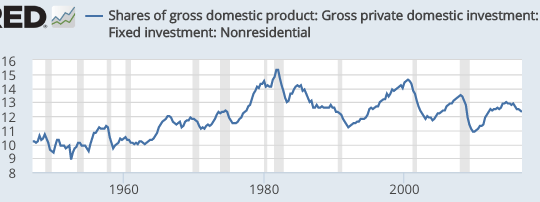Three podcasts
I recently listened to three podcasts, involving James Bullard, Miles Kimball and Tyler Cowen. In all three cases, I found myself agreeing with most of the ideas. Here I’ll mention a few areas of slight disagreement.
1. David Beckworth interviewed James Bullard on monetary policy. Most of what he said made a lot of sense, including his comment that the Fed might be more sympathetic to the NGDP targeting idea if it were starting from scratch, rather than already having invested a lot of credibility capital into inflation targeting (my words, not his.) My only major area of disagreement was when Bullard worried that the NGDP target would have to be adjusted when the trend rate of RGDP growth changed. In my view that’s not necessary, except perhaps for the part of RGDP growth changes that reflect changes in labor force growth.
2. Miles Kimball talks about the need for faster RGDP growth, and discusses some ideas for getting there. He points out that we can’t get significantly faster growth from sectors that have shrunk to a small share of GDP, such as agricultural, and to some extent even manufacturing. He suggests the big problem area is housing, which absorbs a big (and increasing) share of the consumer budget, but which is seeing virtually no productivity growth. He focuses most of the talk on making the service sector more efficient.
It’s interesting listening to the Kimball and Cowen podcasts back to back. In both cases you see Mormon cultural ideas lurking in the background (indeed both speakers alluded to this religion.) Both are very idealistic, like top 2%. Kimball suggests imposing a tax surcharge that can be avoided entirely if you donate the equivalent amount to an approved charity. He argues that donating money makes people less cynical and more altruistic, as compared to being forced to pay taxes to a government bureaucracy that doesn’t seem interested in where you or I think the money should go. Perhaps people would not work as hard to evade this sort of “tax.”
3. Cowen notes that people who donate to charity tend to be happier. He also believes that economic growth is the best way to boost living standards, even for the poor. (Both Kimball and Cowen emphasize that “growth” should include factors like the environment.) I’m agnostic on the happiness studies—I wonder if perhaps we’ve got causation wrong; maybe happiness causes altruism and high incomes, not vice versa. But given that we don’t know, we should probably err on the side of assuming that at least some correlation runs from charity and growth to happiness. (Tyler has a very interesting discussion of what we should do when we don’t know for sure which theory is true.)
Cardiff Garcia did a great job in his interview of Tyler. Much of it focused on Tyler’s new (unpublished) book, which discusses the philosophical ideas that underlie his other writings. They ended with a discussion of the NBA. In my view, this is a golden age of basketball. Never have there been so many great players (AD, Paul George, Chris Paul, Jimmy Butler, Isaiah Thomas, Giannis, John Wall, etc.) who are not even in the top 6 NBA players. Some of these guys would have been borderline MVPs in previous generations. But I do have one complaint. The NBA really needs to change one of its rules, as defense gradually evolves to make any sport less entertaining. Here goes:
New rule: Officials should ignore minor intentional fouls on fast breaks, where a call would clearly favor the defense. If the intentional foul is so extreme as to physical stop the fast-breaking offensive player (such as tackling or wrapping up) the official should award (one or two) free throws plus the ball.
In other words: Discretion, not rules!
I miss the old “showtime era” of the 1980s, when fast breaks were more common. There is something wrong with a rule where:
1. Calling the foul helps the team that commits the foul.
2. Calling the foul makes the game more boring.
In economic terms, calling a foul has a “cost”, as they make the game more boring. Fouls can only be justified if they have an even greater benefit to fans. Often they do—preventing excess physicality—but not minor intentional fouls on fast breaks.
PS. Westbrook should be the MVP. He won 47 games with the rest of his team being worthless. He outplayed Harden when both were on the floor in the playoffs, despite Harden’s supporting cast being far, far better. He only lost because the Thunder were complete garbage in the 5 minutes he wasn’t on the floor each game. Obviously LeBron is the best player in the NBA, but he’s not the MVP this year. His team is talented, and should have won more games.


